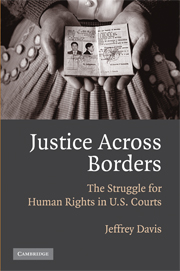Book contents
- Frontmatter
- Contents
- Acknowledgments
- JUSTICE ACROSS BORDERS
- 1 The Seeds of Legal Accountability
- 2 Competing Forces in the Struggle for Accountability: An Overview of the Issues Entangling ATS Litigation
- 3 Human Rights Entrepreneurs: NGOs and the ATS Revolution
- 4 Separation of Powers and Human Rights Cases
- 5 No Safe Haven: Human Rights Cases Challenging Foreign Countries and Nationals
- 6 Holding Corporations Accountable for Human Rights Violations
- 7 Sorting through the Ashes: Testing Findings and Predictions through Quantitative Analysis
- 8 Impacts and Conclusion
- Index
- References
1 - The Seeds of Legal Accountability
Published online by Cambridge University Press: 05 June 2012
- Frontmatter
- Contents
- Acknowledgments
- JUSTICE ACROSS BORDERS
- 1 The Seeds of Legal Accountability
- 2 Competing Forces in the Struggle for Accountability: An Overview of the Issues Entangling ATS Litigation
- 3 Human Rights Entrepreneurs: NGOs and the ATS Revolution
- 4 Separation of Powers and Human Rights Cases
- 5 No Safe Haven: Human Rights Cases Challenging Foreign Countries and Nationals
- 6 Holding Corporations Accountable for Human Rights Violations
- 7 Sorting through the Ashes: Testing Findings and Predictions through Quantitative Analysis
- 8 Impacts and Conclusion
- Index
- References
Summary
Tonight you have power over me, but tomorrow I will tell the world.
– Dolly Filártiga, 1976THE REACH OF JUSTICE – ROMAGOZA V. GARCIA
Dr. Juan Romagoza Arce was treating poor villagers affected by El Salvador's civil war when he was captured by the National Guard and tortured for twenty-four days. His captors hung him by his hands, shocked him, broke bones in his hands, and shot him in the arm. They used methods calculated to rob Dr. Romagoza of his ability to perform surgery. Today, though he is director of a medical clinic in Washington, D.C., his injuries prevent him not just from performing surgery but also from practicing medicine. He has attributed his inability to the deep, long-term effects of torture. “I think that my limitation is more emotional, psychological,” Dr. Romagoza observed. He stated, “It is more related to…Fear. Stress. They stripped me of my gift.”
Years after Dr. Romagoza's release, when commanders of El Salvador's security forces were discovered in the United States, he joined a lawsuit organized by the Center for Justice and Accountability (CJA). CJA filed the case under an obscure provision of the Judiciary Act of 1789, now referred to as the Alien Tort Statute (ATS), which gives federal courts jurisdiction over civil actions brought by aliens for violations of international law. Dr. Romagoza struggled with the decision to join the suit. He began receiving calls and letters threatening him, his mother, and other family members still living in El Salvador.
- Type
- Chapter
- Information
- Justice Across BordersThe Struggle for Human Rights in U.S. Courts, pp. 1 - 22Publisher: Cambridge University PressPrint publication year: 2008

